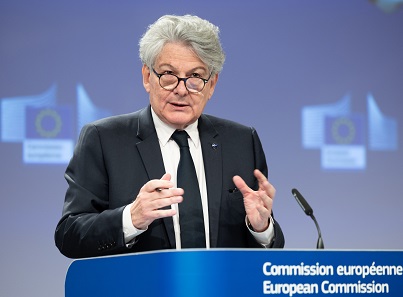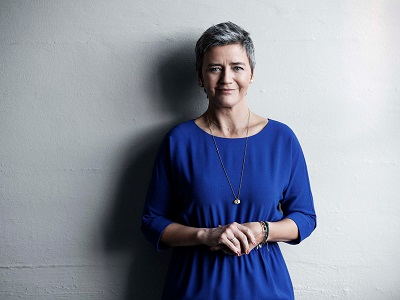No major changes in EU Commission final proposal for FRAND regulation
After a heated discussion in the global tech community, the EU Commission today presented its proposal for a European FRAND regulation. Stricter monitoring of the standard essentiality of SEPs and more transparent licensing are cornerstones of the paper. In addition, the EUIPO will be responsible for implementing the measures. Overall, however, those hoping for sweeping changes will be disappointed by the proposal.
27 April 2023 by Mathieu Klos
The EU Commission today published a comprehensive package of measures on intellectual property in Europe. It includes proposals to regulate EU-wide supplementary protection certificates (SPCs) and compulsory licensing on patents. However, of particular interest is the setting out of new rules on standard essential patents (SEPs) in Europe.
European Commissioner for Internal Market, Thierry Breton, and Executive Vice-President for a Europe Fit for the Digital Age, Margrethe Vestager, presented the new measures today in Brussels. According to the EU Commission, the new rules aim to help companies, especially SMEs, make the most of their inventions. The proposal aims to leverage new technologies and contribute to the EU’s competitiveness and technological sovereignty. However, in recent weeks, the draft has met with a great deal of incomprehension in the industry and among experts.
An open dialogue
According to the proprosal, its aims are three-fold:
- To ensure that end users, including small businesses and EU consumers benefit from products based on the latest standardised technologies
- To make the EU attractive for standards innovation
- To encourage both SEP holders and implementers to innovate in the EU, make and sell products in the EU and be competitive in non-EU markets.
New rules on SEPs, and therefore on FRAND, will continue to be the subject of much discussion. An especially salient point is how the EU Commission plans to establish a competence centre under the umbrella of the European Union Intellectual Property Office (EUIPO). Currently, the office is mostly concerned with copyright and trademark issues. As such, experts are criticising its limited expertise in SEPs and FRAND.

Thierry Breton
However, to ensure greater transparency in SEP licensing, the commission proposes the EUIPO maintain a list of SEPs and their holders. The latter must then sign up with the EUIPO to charge patent fees or take legal action against implementers.
The EU Commission also envisages, in the future, the EUIPO carrying out essentiality checks. Until now, SEP holders themselves have declared their patents as relevant for standards, with standardisation organisations such as ETSI not checking SEP essentiality. However, while market players consider many mobile communications patents as over-declared, the EUIPO’s essentiality check would be non-binding.
Instead, to aid greater transparency, SEP owners would provide the centre with their standard terms and conditions, including royalties and discount policies. A FRAND determination by mediators would be mandatory, if non-binding, before parties can then litigate in UPC countries.
EU Commission remains firm
Apparently, the commission also wants to ensure that SEP holders and implementers conclude FRAND licensing negotiations before entering into litigation. The proposal indicates that the EU will give parties a maximum term of nine months to reach agreements. The proposal states, “The FRAND determination should simplify and speed up negotiations concerning FRAND terms and reduce costs.”
According to the proposal, the FRAND determination would be a mandatory step before an SEP holder can initiate patent infringement proceedings, or an implementer can request a determination or assessment of FRAND terms and conditions before a competent court of an EU member state.
The market had become aware of these key points at the end of March, when a first draft was leaked. Despite heated discussion and intervention by various stakeholders, the EU Commission has not changed the basic points of the draft. However, it has adjusted a number of details. Upcoming discussions in professional circles will demonstrate to what extent these details will affect FRAND-rate setting, SEP litigation and the industry.
Relevant to all standards
According to an EU Commission press release, “The proposed regulation will apply to all standards that will be published after its entry into force”. An exception is where specific market distortions due to inefficient SEP licensing leads the commission to include them within its scope of application.

Margrethe Vestager
Furthermore, the commission will determine which of the standards, their implementations or use cases would be excluded from the royalty setting and FRAND conciliation process. This would be in situations where the respective SEP licensing does not pose significant difficulties or inefficiencies affecting the functioning of the internal market.
Observers also expect the new system to be self-financing. The EUIPO estimates that set-up cost of the competence centre and register, including IT infrastructure, will amount to around €2.4 million. It may also involve the workload of up to twelve full-time staff members. System running costs will require around €2 million annually.
Assessing the market reaction
The EU Commission’s plans have given rise to an extensive discussion. When the first draft of the proposal was leaked, the EUIPO’s involvement was the main cause of controversy in the global patent community.
For example, some observers complained about an “unbalanced” proposal which was too implementer friendly. Many critics are already predicting the end of Europe as a centre of technology, accusing the EU Commission of sloppy work. They fear that patent holders will move to other jurisdictions for their SEP litigation in the future. On the other hand, JUVE Patent sources have described the final draft as going too far in appeasing SEP holders. They say the proposal misses an opportunity to fully address the problem of a lack of market transparency, not having the courage of its convictions to follow through with a concrete approach.
Experts also fear that the proposal could weaken ETSI as the main standard-setting body for mobile communications in Europe. Other experts also see a weakening of the Unified Patent Court, and the role of national courts in determining FRAND-licensing rates. This is because, in the future, competence centres at the EUIPO instead of patent courts might examine important questions regarding SEP disputes. Major topics at the courts currently include essentiality and FRAND determination.
SEP holders voice fears that the proposal is “bad for technological development in Europe” and “destabilises the global telecommunication market.”
Next steps on FRAND
The EU Commission’s proposal is not yet enshrined in law – indeed, it will be a long time before the rules are applied. Firstly, and perhaps most importantly, the EU member states in the European Council and the EU Parliament must agree on the proposals.
It is likely that companies and interest groups involved in the SEP/FRAND sector will use this time to intervene with EU parliamentarians and member state governments to achieve changes in their interest. Following publication of the first, leaked, draft, the EU Commission received numerous opinions.
Two years ago, the reform of German patent law showed how economically important new legal conditions are for SEPs. Following an intense public discussion and numerous lobbying activities, in 2021 the German government decided to give its patent judges more leeway to suspend the automatic injunction. Implementers and the automotive industry had long since demanded such reform. (Co-authors: Konstanze Richter and Amy Sandys)